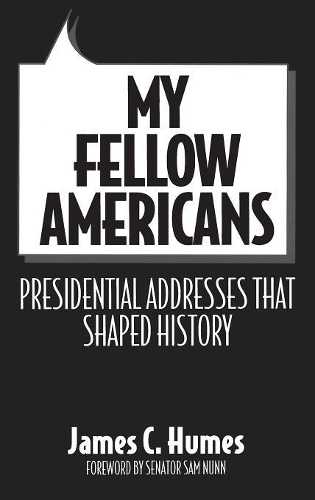
My Fellow Americans: Presidential Addresses That Shaped History
(Hardback)
Publishing Details
My Fellow Americans: Presidential Addresses That Shaped History
By (Author) James C. Humes
Bloomsbury Publishing PLC
Praeger Publishers Inc
23rd March 1992
United States
Classifications
Tertiary Education
Non Fiction
Central / national / federal government policies
Public opinion and polls
081
Physical Properties
Hardback
312
Description
The presidency, in Theodore Roosevelt's famous words, is a "Bully Pulpit". This book, in a sense, is a study of American political history seen through the prism of selected presidential addresses. It reveals how presidents used major addresses to give a theme for their administration, to introduce history-making legislation or programmes, or to rally successfully a majority of the nation behind their policies. A single speech can be a defining point in American history, such as the Kennedy Inaugural ("Ask not what your country can do for you, ask what you can do for your country"), or a rallying cry, such as Franklin Roosevelt's inaugural ("The only thing we have to fear is fear itself"). It can become an American creed as did the Gettysburg Address or a prophecy like the Reagan address to the Houses of Parliament in 1982. Washington's Farewell Address would prescribe American conduct in foreign policy for a century, as did the Monroe Doctrine in 1823. Sometimes it is a Declaration of War as Wilson's in 1917, or a "war" against an economic elite like Jackson's Bank veto in 1832 or Cleveland's Tariff message in 1887. This book is the story of the presidency through an analysis of the major presidential addresses. It is addressed not only to historians and political scientists but also to students of the presidency and government.
Reviews
Former presidential speechwriter Humes here provides interesting analyses of 16 famous presidential addresses. Among those featured are Washington's Farewell Address, the Monroe Doctrine, the Gettysburg Address, FDR's first inaugural speech, JFK's inaugural speech, and Nixon's toast to Chairman Mao. Humes discusses the historical circumstances and significance of each address.-Choice
"Former presidential speechwriter Humes here provides interesting analyses of 16 famous presidential addresses. Among those featured are Washington's Farewell Address, the Monroe Doctrine, the Gettysburg Address, FDR's first inaugural speech, JFK's inaugural speech, and Nixon's toast to Chairman Mao. Humes discusses the historical circumstances and significance of each address."-Choice
Author Bio
JAMES C. HUMES, an adjunct professor at the University of Pennsylvania, is a former presidential speechwriter for Eisenhower, Nixon, Ford, Reagan, and Bush. In addition, he is a former Woodrow Wilson Fellow at the Center for International Scholars at the Smithsonian, and he has lectured across the country and abroad on the theme of presidential history. Humes is also the author of seven books on speech making and preparation, a biography of Winston Churchill, and was the editorial advisor for former President Ford's memoirs Time to Heal.
